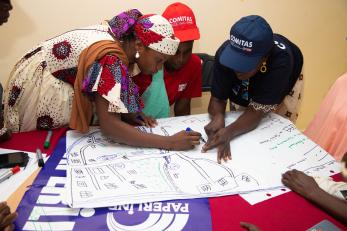Implementing Collaborative Responses to Resource-Based Violence
Conflict Mitigation, Natural Resources Management, and Services Delivery Action Plan

Natural Resources Management Plan COMITAS Annexes ▸
The competition for shared natural resources between farmers and herders in Adamawa and Taraba States, its accompanying effects on social relationships, and the humanitarian toll on communities cause complex emergencies. The conflict complicates trust in local authorities, state security services, and relationships between farmer and herder communities, creating many adverse effects on Natural Resources Management (NRM), food security, and other dimensions of human security. Moreover, the changing ecological and environmental conditions caused by climate change impact the socio-economic interdependence between farmers and herders, who are constantly seeking alternative ways of sustaining their livelihoods and traditional natural resource-related activities. Due to these combined factors that intensify resource-based violence, it becomes crucial to acknowledge the growing understanding that social cohesion and conflict transformation efforts should also focus on improving socio-economic development.
Through this EU-funded integrated peacebuilding intervention implemented by IOM, SFCG, and MC, this action plan provides a comprehensive description of the resource-based issues and the proposed stakeholders’ responses to transform the drivers and impacts of farmer-herder conflicts and enhance NRM. It also shows that integrating the whole-of-government and whole-of-society approaches to improve service delivery and mitigate resource-based conflicts enables a “New Collaborative Approach” to addressing NRM, resource-related service delivery, and resource-based conflict mitigation. The plan also integrates a gender-responsive approach to addressing diverse resource-based issues prioritized by communities to ensure gender-transformative outcomes at community and policy levels.
This action plan is driven by the knowledge that supporting stakeholders to prioritize resource-based issues, service delivery gaps, and the prospective options they will implement enhances collaborative and concerted efforts to manage shared natural resources and resolve conflicts. Its cross-cutting approach to promoting NRM, conflict mitigation, and addressing sustainable development challenges and opportunities reinforces the organization’s COPE, ADAPT, and THRIVE resilience framework. It also amplifies the strategy’s overall [in]direct influence on physical, social, and environmental management, economic value enhancement, and improvement of socio-economic inclusion across communities.

